
|
Sale 33
Manuscript and Collectibles Auction
| Lot |
Photo |
Description |
Realized |
Lot 363 |
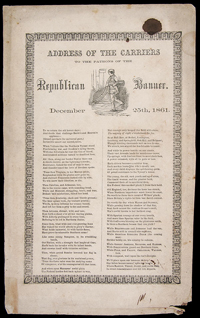 |
"Address of the Carriers to the Patrons of the Republican Banner". Patriotic poem dated December 25, 1861 and issued in the form of a Special Edition Broadside, 1p, 12"x7¼". The 21-stanza poem was written to stir pride in the recipients of the Nashville newspaper and to unite them in their resistance "to win anew their freedom or die." The poem is a veritable history of the war up to that point, from a Southern point of view, invoking "our sacred cause" and decrying "When Vulture-like the Northern Tyrant stood Proclaiming war…." The bravery of the South is vaunted: "when proud Sumter lowered her flag in shame…'Twas Southern valor won the undying name of conqueror…." Many of the battles in the first year of the war are named, as are the foremost Southern generals at the time: Beauregard, Johnson, Buckner, Polk, Sidney Johnson, Zollicoffer, etc. Fine; overall toning, a couple of ink stains at top, and ragged lower right edge, affecting nothing. The antecedents of this Nashville newspaper stretched back to 1812, emerging in 1837 as the Republican Banner. It became the first permanent daily newspaper to serve the Nashville area and the first to operate its presses by steam. On February 23, 1862, Nashville surrendered to Gen. Ulysses S. Grant's Union troops and the Republican Banner suspended publication for the remainder of the war.
Estimated Value $1,500 - 2,000.
View details and enlarged photo
| Unsold |
Lot 364 |
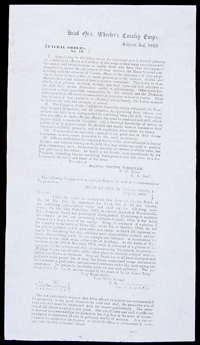 |
Broadside From Joseph Wheeler's Cavalry Corps. Broadside signed in print by Maj. Gen. Joseph Wheeler, 1p, 12"x6¾", "Head Qr's Wheeler's Cavalry Corps, August 3rd, 1863," Fine; some minor ink transfer throughout. With General Orders No. 10, Wheeler urges his cavalry officers to do all in their power to obtain promotions for the officers and soldiers in their command who have exhibited valor and skill in their encounters with the enemy. He notes, "Valor alone does not suffice to make efficient officers, but must be combined with skill, which implies ability to maintain discipline, and a thorough knowledge of tactics, to qualify them to prepare troops for the field and enable them to manoeuvre their commands skillfully, promptly, and with regularity, when before the enemy." An example is given of the proper form to be used in recommendations for promotion, followed by the admonition that the specific acts of valor and skill must be mentioned, as well as the vacancy for which the officer is recommended and how it became vacant.
"Fightin' Joe" Wheeler (1836-1906) was appointed Major General January 20, 1863. His cavalry exploits are legendary: He was wounded three times and had over a dozen horses shot out from under him. He later servied in the Spanish-American War and retired in 1900 as B.G. USA. He is one of a few Confederate officers to be buried in Arlington National Cementery.
Estimated Value $1,000 - 1,500.
View details and enlarged photo
| Unsold |
Lot 365 |
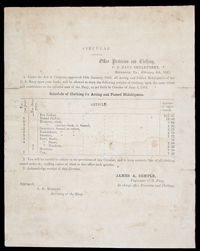 |
C.S. Navy Department Circular. An ultra-rare circular from the C.S. Navy Department, Office Provision and Clothing, 1p, 10¼"x8", Richmond Va., 1865 Feb. 6. An addendum to navy regulations as authorized by Act of the Confederate Congress on January 19, 1865, stipulating clothing allotments to serving midshipmen. Signed in type by James A. Semple, Paymaster C.S. Navy and S.R. Mallory, Secretary of the Navy. Very good; minor staining does not affect legibility.
The Confederate Navy was created by act of Congress on February 21, 1861 and was organized along the lines of the old United States Navy, 231 Confederate officers having resigned from service in the former. No official provision was made for acting and passed midshipmen until the Amendatory Act of April 1862. Until 1865, commissioned officers were expected to outfit and supply themselves. Unlike their army brethren, Confederate sailors never lacked for food or basic clothing, but they were cash poor, a problem that was never satisfactorily resolved.
Estimated Value $1,000 - 1,500.
View details and enlarged photo
| Unsold |
Lot 366 |
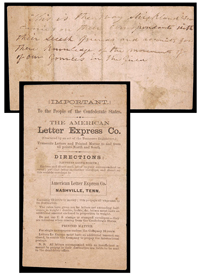 |
Circular From the American Letter Express Company. An exceedingly rare and short-lived cirular relating to Confederate States postal history, being a nearly pristine example of the American Letter Express Co. advertisement, 1p, 5¼"x3", Nashville, Tennessee, c. July-August 1861. Announcing "To the People of the Confederate States" uninterrupted letter service "to and from all points North and South." The company was chartered by the Tennessee Legislature and was incorporated on June 28, 1861 by Messrs. Thomas E. Jackson and William McGill as an alternative means of conveying letters and printed material to the Northern states following the suspension of national postal service on June 1, 1861.
Mail destined for the north was collected at Nashville bearing an American Letter Express Co. label glued to an envelope that enclosed the original letter, together with the company's prepaid fees, usually 15 cents. The letters were then expressed to Louisville for distribution to points in the Union. With President Lincoln's acquiescence, Postmaster Montgomery Blair ordered the service discontinued on August 26 and its agents arrested. An intriguing ink notation on the verso reads, "This is the way Strickland & Co. carried on their correspondence with their secesh friends and accounts for there [sic] knowledge of the movement of our forces in the field." It is estimated that fewer than a dozen specimens of complete American Letter Express Co. advertising labels survive.
Estimated Value $2,000 - 3,000.
View details and enlarged photo
| Unsold |
Lot 367 |
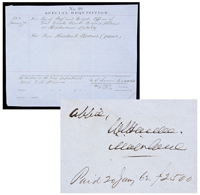 |
Clark, Charles & Hardee, William. Special Requisition Signed "Chas. Clark Brig. Gen. Comdg" on the front and endorsed "W.J. Hardee, Majr. Genl." on the verso, 1p, 8"x10½". Fine. Clark requests $5,000 to pay his staff and Brigade officers at Hopkinsville, Kentucky for January, 1862. At the lower left of the form is the comment, "No money in the Pay Department." Major V.K. Stevenson, who became Gen. Nathan Bedford Forrest's Brigade Quartermaster, signs below the note. Clark was twice wounded (Shiloh and Baton Rouge) and once captured; he became wartime governor of Mississippi, where he paved the way for passage of a bill providing for the enlistment of slaves as soldiers. Hardee was one of the finest Corps commanders of the Confederacy.
Estimated Value $700 - 900.
View details and enlarged photo
| Unsold |
Lot 368 |
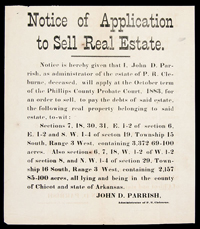 |
(Cleburne, Patrick Ronayne). Broadside titled "Notice of Application to Sell Real Estate," 1p, 8"x7", Arkansas, 1883. Signed in print by John D. Parrish, "Administrator of P.R. Cleburne." In part: "Notice is hereby given that I, John D. Parrish, as administrator of the estate of P.R. Cleburne, deceased, will apply at the October term of the Phillips County Probate Court, 1883, for an order to sell, to pay the debts of said estate…." Several parcels of land in Chicot County, Arkansas, totaling over 5,500 acres, are listed. Cleburne, an Irish immigrant who found the success in Arkansas that eluded him in Ireland, was killed at the Battle of Franklin on Nov. 30, 1864. He is considered by many scholars today to have been one of the South's finest field officers and deserving of the contemporary epitaph "Stonewall of the West." Cleburne was largely unheralded in the "Lost Cause" movement of the late 19th century because of his foreign birth and his incendiary war-time suggestion that slaves should be freed and used as soldiers. Cleburne never married and his estate was left open for nearly 20 years after his death. It is likely that by 1883 the time limitation under Arkansas stature required that the estate be closed.
Estimated Value $2,000 - 3,000.
View details and enlarged photo
| Unsold |
Lot 369 |
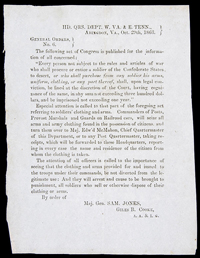 |
Confederate Broadside Citing Penalties For Civilians in Possession of CS Arms and Equipment. General Orders No. 6, 1p, 7"x5¼", Hd. Qrs. Dept. W. VA. & E. Tenn., Abingdon, VA, 1863 Oct. 29. Fine. An obscure military order that followed from an 1863 Confederate Congressional Act that made it illegal for civilians to "procure or entice soldiers of the Confederate States to desert," or to be in possession of government property, specifically "arms, uniform, clothing, or any part thereof." Given by order of Maj. Gen. Samuel Jones. In reality, this document is a very serious attempt to publicly subvert the growing epidemic of army desertion by co-opting civilians that might be found in possession of contraband soldier's equipment. In regions such as western Virginia and eastern Tennessee, loyalties were either divided or suspect; this order gave authorities added legal means to prosecute civilians who might also be Union sympathizers or, worse, armed bushwhackers and bandits.
Estimated Value $1,800 - 2,200.
View details and enlarged photo
| Unsold |
Lot 370 |
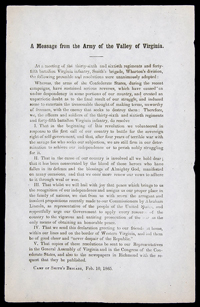 |
Confederate Broadside Resolution of Smith's Brigade. An impassioned late-war public declaration, "A Message from the Army of the Valley of Virginia," 1p, 9½"x6", "Camp of Smith's Brigade, Feb. 10, 1865." Members of Colonel Thomas Smith's Brigade, Wharton's Division, list five resolutions that they have adopted. They exhort those with "unpatriotic doubt" to stand firm in the face of adversity, and reaffirm the principles of "self-government and independence" for which "we volunteered in response to the first call of our country…." This imprint is a clear rejoinder to the unofficial Hampton Roads Peace Conference that occurred on February 3, 1865 aboard the Federal transport River Queen involving President Lincoln and Secretary Seward and three Southern commissioners appointed by Jefferson Davis to explore possible terms for a negotiated peace settlement. Rarely did soldiers involve themselves in public pronouncements pertaining to matters of policy, but the message this broadside conveys is that there is still some fight left in these Confederates, not to be confused with bravado. It is a fact that the few survivors of Smith's Brigade chose to disband in April 1865 and to go home rather than formally surrender. A rare Confederate broadside.
Estimated Value $900 - 1,100.
View details and enlarged photo
| Unsold |
Lot 371 |
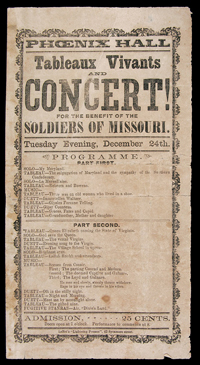 |
Confederate Broadside: "Tableaux Vivants and Concert! For the Benefit of the Soldiers of Missouri". Broadside advertising a Christmas Eve concert in Phoenix Hall (no town), 1p, 12"x6¼", n.d. (believed to be 1861). Admission was 25 cents. "Tableaux vivants" were a form of visual performance wherein costumed actors played to a dramatic scene or vignette by posing silently without moving, always accompanied by music or narration. The "programme" selection combined popular with patriotic tunes, rather than sentimental and religious ones; the last piece was "Dixie's Land." The location of "Phoenix Hall" is unknown, probably not St. Louis, which was by then firmly under Federal control. There is no mention of a local "Ladies Aid Society" as organizers of the event, so it may well have been a commercial venture. Whatever the case, any Missouri Confederate document is extremely rare.
Southern-leaning Missouri was officially admitted to the Confederacy on November 28, 1861, but Missouri's conflict had really begun in the 1850s with "Bloody Kansas." Missouri was the only state north of the Mason-Dixon line where slavery was legal. Blood feuds and guerilla warfare made the war especially brutal. After Virginia and Tennessee, Missouri witnessed more battles and engagements than any other state--more than 1,000.
Estimated Value $1,800 - 2,200.
View details and enlarged photo
| Realized
$2,530 |
Lot 372 |
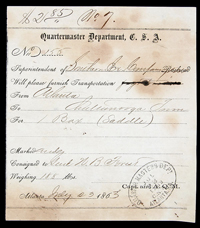 |
(Forrest, Nathan Bedford). Receipt with "Quartermaster Department, C.S.A." masthead, 1p, 6¾"x6", Atlanta, 1863 July 23, for shipping a new saddle "Consigned to Genl N.B. Forest," from Atlanta to Chattanooga via Southern Express Company. With "Quarter Masters Dept. C.S.A., Atlanta, GA" date-stamp. John U. Ansley, Capt. and M[ilitary] S[tore] K[eeper] pens on the reverse: "These Stores were shiped…at my request per Express. This manner of transportation being necessary to insure their delivery in the time required." The receipt lacks a description of the saddle, but given that Forrest was an aficionado of horseflesh, it is reasonable to expect that the saddle in question was custom made to order in Atlanta. Very good; uneven toning and minor erosion from iron gall ink. An otherwise ordinary document that soars to the extraordinary based on its association with cavalryman and iconoclast Nathan Bedford Forrest.
Estimated Value $1,500 - 2,000.
View details and enlarged photo
| Unsold |
Lot 373 |
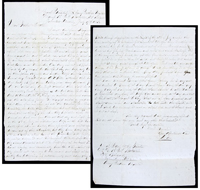 |
Gettysburg Letter By A Confederate In the 1st Maryland Battalion. Daniel A. Fenton, a sergeant in Co. G, 1st Maryland Battalion of Infantry, Steuart's 3rd Brigade, Johnson's Div., Ewell's 2nd Corps, writes a letter to his mother and father, 2 pp (1 sheet), 12"x8" in dark brow ink, Headquarters, Army Northern Virginia, Camp 1st Md. Battalion…July 19th 1863. In part: "Well, we are all safe on the south side of Potomac, minus about eight thousand which will cover our loss entire. It was the first great battle I have been engaged in and I don't care about being in such another one….Our Army was not whipped in that last fight by any means. On the first day our boys, only two divisions of them, drove Reynolds and another Corps over four miles. On the second day Longstreet and A.P. Hill attacked their left and centre and badly whipped them taking near seven thousand prisoners. On the third day our Left attacked their right. In this fight I was a actor. Ewell commanded us. We took their first line of breastworks. About 10 o'clock A.M. of the 3rd of July a charge on another line was ordered. We charged and as we went over a hill that shut them from our view up rode the Yankees behind four lines deep of brestworks. We broke their first line but not being supported had to fall back, this was the only place where they held us in check….out of four hundred and eighty seven men our Battalion took into the fight we lost about two hundred….This army is going to do something in a few days that will astonish the King Abe…."
The 1st Maryland Battalion fought among the bitterest and bloodiest engagements along the southeastern slopes of Culp's Hill at Gettysburg. Fenton enlisted on April 1, 1863 and was captured in the fighting on the Weldon Railroad in Virginia in August 1864. He was exchanged from Point Lookout, Maryland on Jan. 19, 1865; he returned to his regiment and fought in the closing battles of the war. He was one of 68 men who surrendered with his unit at Appomattox Court House April 9, 1865. Accompanied by the consignor's research on this unit.
Estimated Value $2,000 - 3,000.
View details and enlarged photo
| Realized
$2,185 |
Lot 374 |
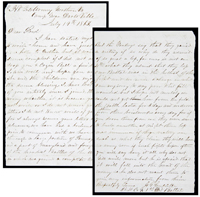 |
Gettysburg Letter By A Confederate In the 1st Maryland Battalion. G.G. Guillette, 1st Sgt. and 2nd Lt. in Co. G, 2nd Md. Infantry, 1st Md. Battalion, writes a letter to Fred, 2 pp (one sheet), 8"x5", "Hd. Qtrs. Army Northern Va., Camp near Dartsville, July 19th, 1863." In part: "…we have had a brilliant campaign…fought one of the hardest battles of the war in which we gained a complete victory. But the Yankees say that they gained a victory if so why do they admit of so great a loss, for ours is not one 4th what they admit that they loss. Our Battal. was in the hottest of the fight and we made a charge in which …poor Whit fell wounded but I hope not mortaly we could not get him from the field. The Battle lasted for 3 days and we drove them from there bristworks every day for if you drove them from one they were sure to build annother at night. There loss was immense if there victory were such as what they claim they will have no army soon if such fights hapen often. You will say …why does not Gill write more but he is afraid that it will fall into the hand of the enemy…." Guillette was captured in the fighting on the Weldon Railroad in Virginia in August 1864. Accompanied by the consignor's research on this unit.
Estimated Value $2,000 - 3,000.
View details and enlarged photo
| Realized
$1,150 |
Lot 375 |
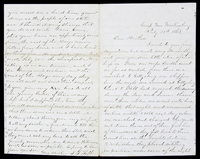 |
Gettysburg Letter By A Confederate In Steuart's Brigard. Thomas J. Webb, a private in Co. F, 2nd Maryland Infantry, Steuart's Brigade, writes a letter to his brother, 4 pp in dark brown ink, 8"x5", "Camp near Martinsburg," 1863 July 18. Very fine. In part: "…Our corps, Ewell's…marched to Gettysburg via Shippensburg….A.P. Hill had engaged the enemy during the day and driven them over three miles. We went into line of battle that night and remained in line untill 5 o'clk next day when we marched out and charged the Yanks and drove them out of their first line of brestworks. They fell back to their second line on the heights distance 1/2 mile where they placed artillery in position under cover of the night….they recieved some 30,000 reinforcements. We attacked them the next morning…but could not take the position. Our battalion suffered more than any other regiment in the brigade as we had to charge up an open field and the remainder of the brigade were protected by the woods. Our loss was frightfull. We went in with over five hundred men and came out with less than two hundred….I thought sure my time had come….Old soldiers tell me that it was the greatest battle that has been fought since the war began….I must have seen over five thousand dead Yankees and some lying, dieing crying for water but we could not stop….We suffer considerable for something to eat…but I am willing to endure it rather than…live…under the Lincoln Government…." Private Webb would be severely wounded at the Battle of Peebles' Farm (30 Sept.-2 Oct. '64). Accompanied by the consignor's research on this unit.
Estimated Value $2,000 - 3,000.
View details and enlarged photo
| Realized
$2,070 |
Lot 376 |
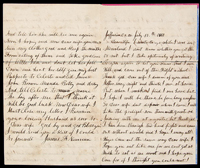 |
Gettysburg Letter By A CSA Artilleryman. James F. Newman, a private in Capt. Fry's Company of the Virginia Light Artillery, also known as the Orange Artillery, writes a letter to his wife, 4 pp (2 sheets), 7½"x4½", Jefferson Co., Va., 1863 July 19. Fine except for a clean split across both pages, easily repaired. Newman tells his wife, "I have been through two hard fights and come out without a scratch… He describes ransacking homes for food when they invaded Pennsylvania, then adds, "we had three days of the hardest fighting that ever was on Record. There was a solid shot passed Rite by my legs and struck one of our men…we had a hundred and eighty cannons all firing at the same time and the yankees about three hundred and the noise they made was beyond discribeing….I worked untill I was completely broke down….we took about 8 thousand prisners and Picket Division went to Richmond with them….We was repulsed with heavy loss and had to fall back for more ammunition.…" Excellent content from a Confederate artillerist who helped open the deadly salvos at the wheat field that preceded the famous charge by General Pickett and his men. Accompanied by the consignor's research on this unit.
Estimated Value $2,000 - 3,000.
View details and enlarged photo
| Unsold |
Lot 377 |
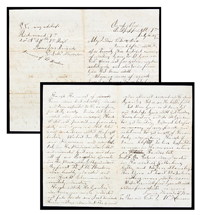 |
Gettysburg Letter From Pickett's Division. W.T. Larson, a member of Co. A, 24th Va. Regt., Kemper's Brigade, Pickett's Division, writes a 3½ pp (2 sheets) letter to his brother and sister, 8"x5", "Camp Near Culpepper C.H., Va, July the 29th, 1863." Very fine. Larson writes that he is "blessed …to pass thru another…bloody battle yes the bloodiest of the war, the battle of Gettesburg in Pa. …All of our company was killed and wounded but fore….I was hit twice whilst we were engaged though it did not prevent me from doing duty….We lost two thirds of our Division and every Col. in the Division was killed and wounded but one and all of our Brigadier Generals in the Division was Killed and wounded. My first Lt. J.W. Headed was badly wounded and our Third Lt. Kiterman was mortally wounded. Though while the Yanks was thining our ranks we did not fail to do our best to whip them where we went. The ground was almost covered with dead Yanks…." Accompanied by the consignor's research on this unit.
Estimated Value $2,000 - 3,000.
View details and enlarged photo
| Realized
$1,323 |
Lot 378 |
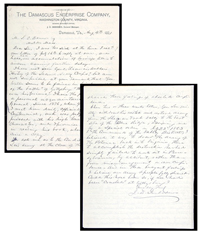 |
Imboden, John Daniel (1823-95) C.S.A. general. He organized the Staunton Artillery (Apr. 1861); named Col. in 1862 and commanded the 1st Va. Partisan Rangers; special appointment as B.G. C.S.A. in Oct. 1862, reporting directly to R.E. Lee. In the Gettysburg campaign, his brigade protected Lee's left flank during the advance into Pennsylvania and covered the wagon trains and the wounded during the retreat. He captured Charleston W. Va during the Bristoe campaign and fought at Piedmont and New Market. After the war, he was a businessman and lawyer.
Autograph Letter Signed "J.D. Imboden," on "The Damascus Enterprise Company" stationery, 8 pp, 11"x8½", Damascus, Va., 1891 Aug. 4. Very fine. Responding to questions from Mr. U.S.O. Dounde of Massachusetts regarding the condition of General Lee's army after Gettysburg and refuting claims that Lee's army was crushed. Exerpts from the letter:
"…Genl. Lee's army was not "crushed", nor was it demoralized. It was repulsed with very heavy loss of life and had to retire to the South Side of the Potomac. Of course we were all depressed by the loss of so many of our brave men, and dear friends, without achieving a victory, which we all expected would be decisively in our favor, and would speedily end the war. But we retired in perfect order, taking all of our unexpended material of war - and all our artillery and small arms, that had escaped the casualties of battle, together with our transportation which was under my immediate escort to Williamsport…where on the 6th of July 63 I defeated Genls. Buford & Kilpatrick, who with 13 Regts. of Cavalry…had been sent there to capture me and all of Genl. Lee's transportation & between 6000 and 7000 of our wounded who were able to be brought away in the wagons….Lee brought away with him 4,200 and odd prisoners who were turned over to me when he reached Williamsport on the 7th & 8th of July; and he was there able to hold his own against the pursuing army successfully, till the night of July 9th when he crossed into Virginia, losing a small part of his rear guard only…."
Imboden recounts his conversation with Lee on the night after the battle of July 3rd. He was given instructions for the retreat and told that he would be given a sealed package for President (Jefferson) Davis which he should protect from falling into the hands of the enemy "at the risk of your life." He reports a conversation between Lee and Longstreet and adds, "…I withdrew, feeling exhilirated by the cheerful spirits of my distinguished superior officers, one of whom I regarded as invincible and unconquerable - our adored Genl. Lee…and I think our whole army shared these feelings of absolute confidence." Much more content. A superb letter!
Estimated Value $4,000 - 6,000.
View details and enlarged photo
| Realized
$2,415 |
Lot 379 |
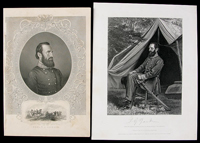 |
(Jackson, Gen. T.J. "Stonewall"). Two engravings: one full figure in uniform with sword and hat, from Nast's painting, 1866, Johnson, Fry & Co, N.Y., 10¼"x8"; the other waist-up in uniform, non attributed, with small vignette of Jackson mortally wounded, 9½"x6½". Fine.
Estimated Value $75 - 100.
View details and enlarged photo
| Unsold |
Lot 380 |
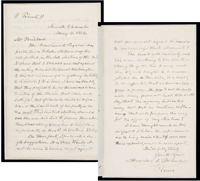 |
Johnson, Herschel V (1848-1849) Governor of Georgia (1853-57); CSA senator. Important Autograph Letter Signed, 3¼ pp, 8"x5", Senate Chamber, 1864 Jan. 4. Very fine; hinged to a slightly larger page. Johnson writes to CSA President Jefferson Davis proposing a secret agent in Canada to promote opposition to Lincoln and to attempt the withdrawal of the northwestern states from the Union. Marked "Private" and addressed to "Mr. President." Johnson notes that a recent poll in the Cincinnati Enquirer showed 1,500,000 people against the administration in Washington, especially in the Northwestern states. He feels that "if Lincoln could be defeated…it would end the war and lead to peace" and proposes "a secret agent in Canada, who by seeking interviews with the right men of the North & N. West (perhaps it might be better to confine it to the North West) might aid in stimulating & organizing more efficiently that opposition, and…result in the withdrawal of the N.Western States from the Union….Might not the experiment be made without compromitting the Confederate States?….There is in the United States a powerful conservative element….Might not an adroit agent do much to encourage that element? The sword will scarcely end this war….it is hardly to be expected that either [side] can conquer a peace. The pen and not the sword will bring peace at last. Who shall say that the agency indicated might not put in motion influences that will prepare the way for the offer of negotiation….$1,500,000 thus expended would be well spent." In an initialled postscript, he adds, "If such an agency shd. be determined upon, it should be known only to the Prest. and the agent." More content. Johnson originally did not want Georgia to secede but went along with his state when it did. He started a peace movement in 1864, of which this letter is apparently a part. We don't know if the agency was ever set up. The consignor has owned this letter since 1975.
Estimated Value $2,000 - 3,000.
View details and enlarged photo
| Realized
$1,495 |
Lot 381 |
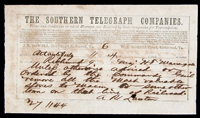 |
(Lawton, Alexander Robert). Telegram sent by CSA Quartermaster General A.R. Lawton from Richmond, 1864 July 11, as Sherman closed in on Atlanta., 1p, 4½"x7¾". To Major H.T. Massengale, a quartermaster branch officer in Atlanta, ordering the removal of "all the Quartermaster valuable stores to Macon or some other town on that line of Railroad." Secretarily written and signed.
Estimated Value $100 - 150.
View details and enlarged photo
| Unsold |
Lot 382 |
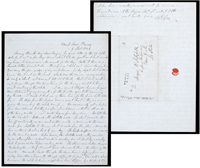 |
Lee, Robert E. Autograph Letter Signed "R.E. Lee," 3¼ pp, 10"x7¾", Camp near Parras, 1846 Dec. 9. Fine; one easily-repaired fold tear on page 3/address panel. To Lee's friend and colleague, Major R. Delafield, in the Corp of Engineers in New York. In part: "…I am much obliged to you for…the trouble you took concerning my horses…We reached here on the 4th Inst…The troops suffered considerable for the want of water….Our route laid through the mountains…frequently through difficult passes…On our arrival here the authorities of Parras waited on Genl Wool & offered him peaceable possession of the town….Parras…contains about 8000 Inhabitants….The ladies visit camp in their…Real English glass coaches…with fat sleek mules…." He describes the wealth of the town, the 20-course dinner for Gen. Wool, the wine, the silverware, the agreeable ladies, and gives a great deal of information about the hacienda of their host. He discusses the abandoned Chihuahua expedition and a rumor that the campaign has been changed. "I presume the reason is that we are too weak to advance further in the county, without being suppd. The reserve troops now in the U.S. ought to be here to support us, but the Pres. has no funds to send them till furnished by Cong. …We learn from Good Authority that Santa Anna has with him at San Luis over 30,000 Infty….Santa A. is drilling his men night & day & has informed his Govt: that if he is not attacked by the Americans by the 15 Inst: He will be ready to move against them…." Santa Anna was known and hated by Americans as the villain in Texas' fight for independence. Excellent content.
Estimated Value $9,500 - 11,500.
View details and enlarged photo
| Realized
$10,350 |
Lot 383 |
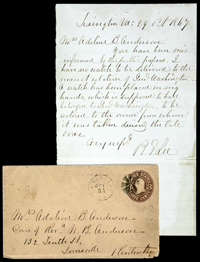 |
Lee, Robert E (1807-1870) Autograph Letter Signed ("R E Lee"), 1p, 8"x5", on ruled paper, Lexington, Va., 1867 Oct. 29. Fine; light edge stains do not affect text or signature. To. Mrs. Adaline Anderson, Louisville, Ky, referring to the political controversy over the pillage and confiscation of George Washington's relics from R.E. Lee's home "Arlington" by Federal troops during the Civil War. Gen. Lee's wife, Mary Custis Lee, who was the great-granddaughter of Martha Washington, possessed relics from Gen. and Mrs. Washington. During the war, Union Gen. McDowell took over Lee's home and made it a Federal post. Many Washington and Lee family items were pillaged by marauding Union soldiers and Gen. McDowell placed the remainder on display in Washington as "Captured at Arlington." In 1868, Gen. and Mrs. Lee petitioned President Andrew Johnson for their return, only to have a radical Congress pass a resolution "that the Washington relics were property of the United States and any attempt to deliver them to the rebel general Robert E. Lee was an insult to the loyal people of the United States."
Gen. Lee writes to Mrs. Anderson: "You have been misinformed by the public papers. I have no watch to be delivered to the nearest relative of Gen. Washington. A watch has been placed in my hands, which is supposed to have belonged to Gen. Washington, to be restored to the owner from whom it was taken during the late war.…." Gen. Lee is careful to avoid saying that the watch was taken from Arlington, but the inference is there. The letter is accompanied by the holograph transmittal envelope. An important letter, linking radical reconstruction policies, the family connection between Washington and Lee, and the pillaging of historical items as spoils of war.
Estimated Value $8,500 - 10,000.
View details and enlarged photo
| Unsold |
Lot 384 |
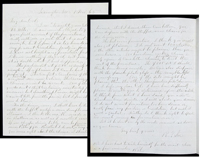 |
Lee, Robert E. Autograph Letter Signed "R.E. Lee" and P.S. signed "REL," 2pp (one sheet), 10"x7¾", Lexington, Va, 1865 Nov 1. Fine. To "My dear Col," regarding furniture for the Lee's home in Lexington, where Gen. Lee was president of Washington College (later renamed Washington and Lee University). The Lee estate at Arlington had been confiscated by Union troops during the war. After Lee's death, the courts ruled that the estate had been illegally seized and that it should be returned to Lee's son. He accepted an offer by the government to buy the land outright. It is now part of Arlington National Cementery.
Gen. Lee gives details of his ideas on furniture price, color, and matching, but his chief concern is cost. In part: "…I am much obliged to you for your full account of the furniture. The difficulty with me is not that it is not handsome enough, but I fear it is too handsome for my present Condition, judging from the price…." He states that prices are double what he had supposed, and adds, "The parlour set at $500 is surely handsome enough….For the dining room, I shall have to dispense with the buffet….about the chairs…I desired them cane bottom, you can dispense with the stuffed arm chairs for the dining room. The bed room furniture I think you might also get plainer….The $208 set I should think handsome enough….dispense with the French plate glass and the marble tops….I have furniture for Mrs. Lee's room….you and Mrs. Buckner can decide….I do not want furniture too handsome or costly for my position or condition but wish it good and genteel. Neither do I think right to spend too much money on furniture now…."
Part of General Lee's legend is based on the fact that he maintained his integrity by turning down offers after the war that would have made him wealthy.
Estimated Value $6,000 - 8,000.
View details and enlarged photo
| Realized
$5,750 |
Lot 385 |
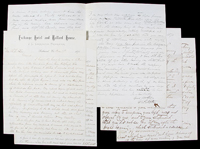 |
Pickett, George & Lee, Fitzhugh. Superb correspondence regarding orders given by Gen. George E. Pickett at "Five Forks" (Mar. 30-Apr. 1, 1865) and Pickett's report that Fitzhugh Lee had not obeyed them. Comprised of three Autograph Letters Signed: one from General Fitzhugh Lee to General George E. Pickett, Pickett's reply to Fitzhugh Lee, and Pickett's resulting letter to General Robert E. Lee.
GEN. FITZHUGH LEE TO GEN. GEORGE E. PICKETT, ALS. 6pp, 9¾"x7¾", Richmond, Va., 1970 May 19. Fine. In part: "…a friend…sent me a copy of your report concerning the operations of 'Five Forks'…I take exception to your intimation that your order to reinforce your left was not obeyed by me and to your statement that you 'did not see gen. Fitz Lee after the fight began.'…you wrote what you did from a misapprehension of all the factors in the case. By Gen. Lee's order I was then in command of the Car: Corps of his Army. In your position at Five Forks one of my Divisions (W.H.F. Lee's) was on your right - another (my old one) on your left - no regiments in line - the remainder retire - to give me and horses rest…The remaining Div. (Rosser's) was in reserve behind your line of battle…I stopped at your tent, and had some little talk with you about the position…a force of the enemy was moving to our left. I immediately went to Gen. Munford commanding the Div. to…ascertain the truth of the report and…move the remainder of his command up to the line. His report will bear that they were in position in time to receive the attack…All of which was done in compliance with an order from you to reinforce the left…Hastily dressing I rode rapidly towards the front. Some distance in my advance I saw you also galloping to your line of battle…When I arrived the enemy having broken in our left, had occupied it. I immediately moved Rosser up and we attacked them, but so larger was their infantry force at that point it was impossible…we were kept busy repulsing their attack and their threatened advance to the RR. The absence of Rosser, myself, and his 2 Brigades from the main fight on the other side of the creek is thus accounted for…The mistake made at 'Five Forks' was in not taking up a line of battle behind the creek……is not to be attributed to you but to the order you received designating your position…their Cavalry Corps (that Gen. Meade told me at the surrender numbered 10,000 men) our Cavalry consisted of 6 small Brigades (3 Div:s) say 3200 men. I don't know your force. I have to request Gen., that in view of additional facts I present…you will have your report of these locations now in the hands of Gen. Lee, changed…."
GEN. GEORGE E. PICKETT TO GEN. FITZHUGH LEE, ALS "G.E. Pickett," 3pp, 9"x7¾", Richmond, Va., 1870 May 23. Fine. In part: "…I have at this present writing no copy of my report…My recollection…Whilst taking up the position at the Five Forks I directed you to cover the right & left flank of the Infantry line with your Cavalry…in reply to a remark of yours that your horses needed rest and feed I said you have to dismount and act as Infantry. Sometime afterwards Gen. Ransom sent a courrier to me saying his left was uncovered and the Cavalry not in the position assigned. I immediately dispatched a courrier to you asking you to have this matter attended to…the enemy had appeared and…the Cavalry were still not in position. I then sent a Staff Offr. to you, Capt. Bright, asking the cause of this delay to the effect that the left must be immediately reinforced…I had gone back to change my horse and write a dispatch to Gen. R.E. Lee and was under the impression that the order had been executed…I lost no time riding to my line of battle…left was unprotected…Stewart…new fighting with all obstinacy but it was too late, the enemy being so very much our superiors numerically, entirely enveloped us…you were evidently of the same opinion…that the cavalry had been put in the designated position…I shall…forward to Gen. R.E. Lee an extract of your letter…."
GEN. PICKETT TO GEN. ROBERT E. LEE, ALS "G.E. Pickett," 2pp, Richmond, Va. 1870 June 19. Fine. In part: "I have the honor to enclose a letter…from Gen. Fitzhugh Lee…asking you to eliminate from my report the paragraph…'did not see Gen. Fitz Lee after the fight began' and also anything from which the inference could be drawn of a disobedience of orders on his part. My report…was in reality written in Canada. I at that time not caring my whereabouts to be known…I…was afraid to delay preferring to do so whilst events were fresh in my memory, and knowing not then at what time, if ever, I should return to my country…From his letter it is evident that Gen. Lee had communicated the order to his subordinate and therefore is relieved from any intention of disobedience of orders…the order never was executed…my wishes to have the Cavalry on the left dismounted, and to act as Infantry (one reason for this was the nature of the ground, being thick with undergrowth & marshy)…Gen. Lee appeared much surprised to learn that the order had not been executed…."
Estimated Value $15,000 - 20,000.
View details and enlarged photo
| Realized
$13,800 |
Lot 386 |
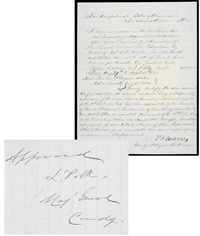 |
Polk, Leonidas. Document Endorsed, "Approved L. Polk, Maj Genl Comdg" on the verso of a recommendation by Col. S.F. Marks, Comdg 1st Brigade 3rd Division, that Edward Allen of the 11th Louisiana Infantry be paid $75 per month for serving as Quartermaster and Commissary until the two soldiers who have been appointed to those positions report for duty, 2pp, 9½"x7½" plus integral leaf with docket, Columbus, Ky, 1861 Nov. 23. Fine. The document is headed "The Confederate States of America To Edward Allen." Allen signs in receipt of $107.50 on the verso and Polk approves the payment. General Polk was killed on Pine Mountain on June 14, 1864. His signature is rare.
Estimated Value $600 - 800.
View details and enlarged photo
| Realized
$891 |
Lot 387 |
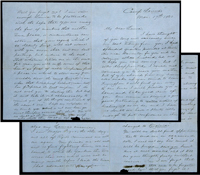 |
Stuart, James Ewell Brown (1833-1864) Legendary Confederate cavalry officer; mortally wounded at Yellow Tavern on May 11, 1864. Autograph Letter unsigned, 4pp, 7½"x5½", whimsically datelined "Camp Laura, Mar: 17th 1862." Fine. One small area of paper loss at the lower edge may have been taken out by Stuart himself; perhaps he had signed with his initials before he decided to be coy and let Laura guess who wrote the letter. Beginning March 9th, eight days before he wrote this letter, Stuart moved out of his winter camp and covered Johnston's evacuation from before Bull Run to Culpeper Court House; his troops were in charge of destroying tons of supplies that the Confederate army had accumulalted at Manassas but could not move. It was during this period of time that Stuart wrote this flirtatious letter with excellent war content referring to the ironclad Merrimack's victories and bragging that he would lead the victorious advance into Pennsylvania. In part:
"…Our enemies are playing a good game pretending to restore instead of destroying as we do, and I have no doubt we have a plenty silly enough to put confidence in their fair promises and soft whining speeches….I hope you will give the Yankees a wide berth and only use the list I gave you in case you got into any serious trouble & required protection. I have no friends on the Yankee side. The enemies of my country are my enemies and I feel assured are also my Laura's enemies….Your friends are all well and in fine fighting trim -- we are bound to whip the Yankees this time worse than ever and it will not be many months before I lead the triumphant advance into Pennsylvania. Let me caution you in the mean time to be prepared for the most outrageous slanders on us and our cause. Turn a deaf ear to all accounts and keep an abiding faith in the justness of our cause and the help of God. We had a glorious naval success at Norfolk -- sinking and disabling 3 vessels. The Cumberland, Congress and Minnesota. It was all done by the Merrimack whose name is changed to 'Virginia'….Can I ever forget that never to be forgotten good-bye! Will you forget it? I am vain enough Laura to be flattered with the hope that…whatever betides me and this eventful year you will in the corner of that heart so full of noble impulses find a place in which to stow away from worldly view the 'young Brigadier' even when that bullet-proof helmet (raven -lock) has fulfilled its last mission. I do not want you to destroy this but keep it and take it out occasionally to remind you of the thoughts and sentiments of the 'absent one'….Can you guess who wrote this, I'll let you try. Good bye."
Estimated Value $12,000 - 18,000.
View details and enlarged photo
| Realized
$12,075 |
Lot 388 |
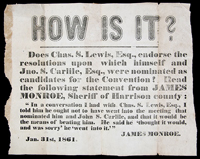 |
Virginia Secession Convention Broadside. Controversial and unique broadside issued by Harrison County, Virginia sheriff, James Monroe, 1 p, 8¾"x10¾". The broadside is a public rebuke to Charles S. Lewis and John S. Carlisle, who were nominated to attend the Virginia Secession Convention (Jan. 31, 1861), even though both men were known to be staunch pro-union advocates (as was the majority of the county). The sheriff questions their integrity on endorsing the resolutions upon which they were elected (pro-secession). Both men attended the Convention, which convened Feb. 13, 1861. On April 17, 1861, Virginia voted to secede and both men walked out, vowing to form a state government loyal to the Union. Both men were instrumental in Western Virginia seceding from Virginia. Carlisle served four years in the U.S. Senate and played a major role in the writing of West Virginia's Constitution. Charles Lewis became the Attorney General. Fine; light toning, uneven left margin, and small lower fold split.
Estimated Value $800 - 1,000.
View details and enlarged photo
| Unsold |
Lot 389 |
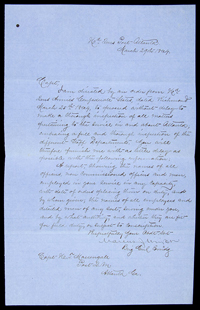 |
Wright, Marcus Joseph (1831-1922) CSA General. Letter Signed "Marcus J. Wright" as Brigadier Commanding, 1p, 12¾"x8", Headquarters Post Atlanta, 1864 Mar. 29. Very fine. To Capt. H.T. Massengale, Post Q.M., Atlanta, requesting a report on everyone employed at the post, both officers and conscripts. The information was needed to fulfill an order Wright had received from Richmond headquarters. In 1878, Wright was appointed Agent of the Confederate Archives and compiled the Confederate States' Official Records.
Estimated Value $300 - 500.
View details and enlarged photo
| Unsold |
|
|